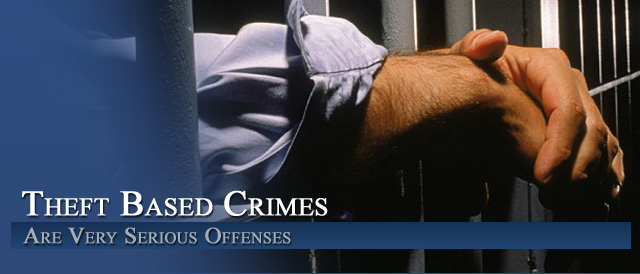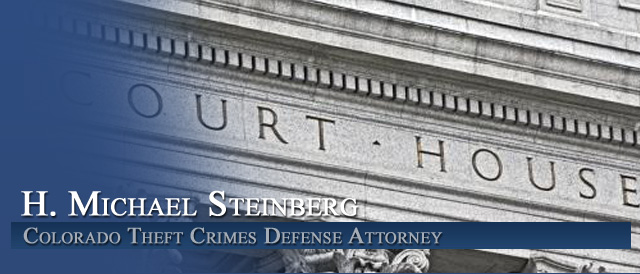




Colorado Shoplifting Laws And Common Defenses To Colorado Shoplifting Crimes
By Colorado Shoplifting And Theft Crimes Criminal Defense Lawyer – Attorney – H. Michael Steinberg
Colorado Shoplifting Laws Explained
Colorado Shoplifting Laws And Common Defenses To Colorado Shoplifting Crimes – is the subject of this article. While Colorado shoplifting may seem minor – (shoplifting is just another name for theft) – a theft conviction on your criminal record can have lifetime impacts on one’s career plans, current employment and future educational opportunities.
Getting arrested for shoplifting is always an embarrassing situation. It has the effect of labeling you as a thief for many years. Just how a shoplifting offense impacts your criminal record is constantly changing as a result of more and more comprehensive background checks.
The concept of shoplifting as “just a minor crime” – may have been popular before the exhaustive background checks of today – as some minonr cases could not be “found” in one’s criminal history. That WAS the case for many years – and yet today – even with the existence of comprehensive and shared databases – friends and family will advise you to save the legal fees and handle the case yourself – go into court – plead no contest and ask for a fine – thus ingoring the risks to your future of a shoplifting conviction.
In the final analysis – it is your reputation in the community and you’re future and the future of your family that matters.
Colorado Legal And Tactical Defenses To Shoplifting – Petty Theft Charges
How To Defend Against A Shoplifting Charge
If you retain our firm – H. Michael Steinberg – an experienced Colorado criminal defense attorney will sit down with you and review your case – first from your prospective and later – when “discovery” has been performed – from the prospective of the facts and evidence that the DA – (prosecutor) has put together.
This initial consultation is only the beginning. The constant question in a shoplifting case in Colorado is whether – assuming the evidence can be established in court – can the DA make out a case of shoplifting – that is can the DA PROVE ALL OF THE ELEMENTS OF THE CRIME?
First Thing In A Shoplifting Case – Read The Law
Here is the main Colorado theft crimes law.. the basic crime of theft is defined in the following law:
§ 18-4-401. Theft
(1) A person commits theft when he or she knowingly obtains, retains, or exercises control over anything of value of another without authorization or by threat or deception; or receives, loans money by pawn or pledge on, or disposes of anything of value or belonging to another that he or she knows or believes to have been stolen,
and:
(a) Intends to deprive the other person permanently of the use or benefit of the thing of value;
(b) Knowingly uses, conceals, or abandons the thing of value in such manner as to deprive the other person permanently of its use or benefit;
(c) Uses, conceals, or abandons the thing of value intending that such use, concealment, or abandonment will deprive the other person permanently of its use or benefit;
(d) Demands any consideration to which he or she is not legally entitled as a condition of restoring the thing of value to the other person; or
(e) Knowingly retains the thing of value more than seventy-two hours after the agreed-upon time of return in any lease or hire agreement.
(1.5) For the purposes of this section, a thing of value is that of “another” if anyone other than the defendant has a possessory or proprietary interest therein.
(2) Theft is:
(b) A class 1 petty offense if the value of the thing involved is less than fifty dollars;
(c) A class 3 misdemeanor if the value of the thing involved is fifty dollars or more but less than three hundred dollars;
(d) A class 2 misdemeanor if the value of the thing involved is three hundred dollars or more but less than seven hundred fifty dollars;
(e) A class 1 misdemeanor if the value of the thing involved is seven hundred fifty dollars or more but less than two thousand dollars;
(f) A class 6 felony if the value of the thing involved is two thousand dollars or more but less than five thousand dollars;
(g) A class 5 felony if the value of the thing involved is five thousand dollars or more but less than twenty thousand dollars;
(h) A class 4 felony if the value of the thing involved is twenty thousand dollars or more but less than one hundred thousand dollars;
(i) A class 3 felony if the value of the thing involved is one hundred thousand dollars or more but less than one million dollars; and
(j) A class 2 felony if the value of the thing involved is one million dollars or more.
Here is a LINK to a CHART That Helos You Understand Felony Penalties and Misdemeanor Penalties In Colorado
Some Questions That Help Analyze The Strengths And Weaknesses Of A Colorado Shoplifting Case
When you entered the store – did you have the intent to steal? Was this a mistake or accident on your part? How does the state prove it was not an accident or mistake on your part? Do they have to prove this directly or can they prove it circumstantially through other indirect evidence?
The Best Defense Is An Offense – Attacking The Police Reports
The police are like everyone else – they want to “win” and their reports reflect that – they are very often biased and one sided. Not only are they not 100% accurate, they are often rife with inconsistencies in time, location, witnesses interviewed and those not interviewed and the like.
Most of the errors are obvious. But sometimes it is the smallest of details – ignored by other lawyers – that will lead to an acquittal. Reviewing the reports carefully is the second most important step in defending a Colorado shoplifting case.
Next – Ask – Do I Have Any Cognizable Legal Defenses to the Crime of Shoplifting?
As you might already know – most shoplifting cases are “private person’s arrests” or “citizen’s arrest.” The arrest is made by store personnel. These risk managers do not have to play by the same rules as the police. Not only do have a right to detain you for shoplifting, unlike the police – they do not need a warrant or probable cause. Tey may act on a reasonable suspicion. There are, however limits on their authority.
Store “loss prevention officers” have certain protections. Among them limits on civil liability as provided by the law below.
18-4-407. Questioning of person suspected of theft without liability
If any person triggers an alarm or a theft detection device as defined in section 18-4-417 (2) or conceals upon his person or otherwise carries away any unpurchased goods, wares, or merchandise held or owned by any store or mercantile establishment, the merchant or any employee thereof or any peace officer, acting in good faith and upon probable cause based upon reasonable grounds therefor, may detain and question such person, in a reasonable manner for the purpose of ascertaining whether the person is guilty of theft.
After The Store “Risk Managers” Put You Into Custody
After the police arrive – ALL of the constitutional protections accorded by law are applicable.. But remmeber you do NOT have to answer the questions of EITHER store personnel OR the police. And the Miranda warnings, illegal searches and seizures ALL apply AFTER the police arrive. MIRANDA
What Are Your Options In A Strong Shoplifting – Petty Theft Case Against You?
If the facts and the law are against you, what are your options – what can be done then?
Plea bargaining may be the best option – seeking so called “alternative dispositions” can usually be worked out with the ultimate goal of avoiding a conviction for a misdemeanor or petty theft offense. Such programs as diversion, deferred judgments, reduction in charges to other less serious crimes that are non-theft related are all potential results.
The Different Levels Of Shoplifting – Theft – The Impact Of The Dollar Amounts
Theft cases always turn on the “dollar amount of the merchandise” taken. The law – revised in 2013 – is reprinted above. To reach the lowest Colorado criminal felony, a theft has to exceed $2,000.00. Misdemeanors and petty offense require much less value.
The Enhancement Of A Shoplifting Charge Where There Is Possession of Burglary Tools
The burglary tool felony enhancement law poses significant risk to the shoplifter who uses the tools of the trade to commit a minor shoplifting crime.
Here is the law that applies in this situation:
18-4-205. Possession of burglary tools
(1) A person commits possession of burglary tools if he possesses any explosive, tool, instrument, or other article adapted, designed, or commonly used for committing or facilitating the commission of an offense involving forcible entry into premises or theft by a physical taking, and intends to use the thing possessed, or knows that some person intends to use the thing possessed, in the commission of such an offense.
(2) Possession of burglary tools is a class 5 felony.
The kind of “tools” they are referred to the law – can be something as simple as a pair of pliers intended to be used as a tool to remove sensor tags from clothing or nail clippers or a small pocketknife used to cut tags off of merchandise.
This enhancement is very serious
If The Store’s Law Firm Sends You A Letter – A Civil Demand For Money BEFORE You Are Prosecuted And – Or Convicted
It is not uncommon these days for the store’s law firm to send a civil demand letter to you before you are ever prosecuted. This “civil demand” letter is intimidating – but do NOT pay what they are asking. When – and if you call our firm – an explanation of the proper course of action and your options can be explained.
Colorado Shoplifting Laws And Common Defenses To Colorado Shoplifting Crimes – Some Typical Shoplifting Fact Patterns
The most common evidence in a Colorado criminal shoplifting case is the act of walking out of a store with items in hand without paying for the items selected. Shoplifting suspects are stopped by a loss prevention officer who then detains the person and calls the police to file a formal report.
Another method is tag switching – that is – when one is caught in the act of changing the price tag on an item with the intention of paying a lesser amount for the item.
Store employees sometimes “tag team” the crime and commit a different kind of shoplifting crime – that is more like embezzlement – such as when the employee assists a shoplifter by not ringing the sale of the item.
There are many more fact patterns.
At times a shoplifter will take an item and later try to return it for a refund. Sometimes it is finding a receipt outside a store – bring it back into the store – locating an item on the receipt and then demanding a refund.
Shoplifting also includes the trick of taking an item from a store, intending to sell it back to the store.
How Is The Value Of The Item Determined In Setting The Level Of The Crime ?
Since the level of the crime turns on the value of the item taken – let’s look at how that is determined. The value is the price at the time of the theft ..so if it is on sale, the sale price controls.
Here is the law in Colorado on value:
18-4-414. Evidence of value
(1) For purposes of this part 4, when theft occurs from a store, evidence of the retail value of the thing involved shall be prima facie evidence of the value of the thing involved. Evidence offered to prove retail value may include, but shall not be limited to, affixed labels and tags, signs, shelf tags, and notices.
(2) For the purposes of this part 4, in all cases where theft occurs, evidence of the value of the thing involved may be established through the sale price of other similar property and may include, but shall not be limited to, testimony regarding affixed labels and tags, signs, shelf tags, and notices tending to indicate the price of the thing involved. Hearsay evidence shall not be excluded in determining the value of the thing involved.
Why The Facts May Make Defense At Times Problematic
The defense of such charges is often difficult if a person is caught walking out of the store without paying for the items selected. These cases always turn on the “intent” of the person arrested.
Inadvertently walking out of a store as a result of a mistake such as being distracted by a cell phone conversation, an e-mail or a text message is very common. Sometimes it is a sick or unruly child, or hearing terrible news leading to emotional trauma – such as an ill parent.
At other times it can be the result of medical conditions such as Alzheimers or diabetes. At these times – the store’s security footage and medical records or family testimony may support such defenses.
The Impact Of Taking A “Theft Class”
The “theft class” may be a good way to address a young – or even an older person’s shoplifting needs.
Taking a shoplifting prevention course before plea bargaining the case demonstrates that a defendant is responsible and sincerely concerned about what caused him or her to steal. The “completion certificate” impresses the prosecutor and later the judge with the defendant’s goal of never committing this crime again. It might mean the difference between a conviction and diversion or a deferred judgement and sentence.
No Need For A Videotape To Prove Shoplifting
Before video cameras there was the observations of a loss prevention officers, eyewitnesses and possible incriminating statements – admissions and confessions by the shoplifter. There is no legal requirement to “produce” a videotape to prove this crime.
Retaining A Colorado Shoplifting – Theft – Petty Theft Lawyer – A Proactive Approach is the Best Defense Against Shoplifting Charges
What is imperative in all shoplifting cases is hiring a defense lawyer immediately after the person is released from custody.
The Steinberg Colorado Criminal Defense Law Firm believes in taking a ” proactive approach” to the defense of shoplifting cases. If you’ve been charged with Shoplifting or any Theft charge for that matter – the best thing you can do is obtain experienced criminal defense as quickly as possible.
Two very important factors in selecting our firm are that if you call our firm (1) you will receive a confidential – no obligation consultation about your shoplifting case and (2) H. Michael Steinberg handles all of his cases personally, and never hands the case over to a less experienced lawyer – non-lawyers – paralegal, secretary, or legal assistant.
The Benefit Of A Locally Well Known And Experienced Colorado Criminal Defense Lawyer
This is always true. A Colorado criminal defense lawyer who knows the local customs and practices of the Court in which you are being prosecuted – may often “find” an alternative to a criminal conviction. Informal diversion programs, alternative dispositions, deferred prosecution or deferred judgments are all possibilities. Reductions in the charges to non-theft offenses, dismissals because of insufficient evidence, are also possibilities.
Colorado Shoplifting Laws And Common Defenses To Colorado Shoplifting Crimes
Denver Colorado Criminal Defense Lawyer
ABOUT THE AUTHOR: H. Michael Steinberg – – Email The Author [email protected]
If you are charged with Colorado Shoplifting, please call our office. The Law Offices of H. Michael Steinberg, in Denver, Colorado, provide criminal defense clients with effective, efficient, intelligent and strong legal advocacy. We can educate you and help you navigate the stressful and complex legal process related to your criminal defense issue.
H. Michael Steinberg, is a Denver, Colorado criminal defense lawyer with over 40 years of day to day courtroom experience – specializing only in Colorado Criminal Law along the Front Range. He will provide you with a free initial case consultation to evaluate your legal issues and to answer your questions with an honest assessment of your options. Remember, it costs NOTHING to discuss your case. So call now for an immediate free phone consultation.
Helping Clients To Make Informed Decisions In the Defense of Colorado Criminal Cases. Colorado Defense Lawyer H. Michael Steinberg provides solid criminal defenses for clients throughout the Front Range of Colorado – including the City and County courts of Adams County, Arapahoe County, City and County of Boulder, City and County of Broomfield, City and County of Denver, Douglas County, El Paso County – Colorado Springs, Gilpin County, Jefferson County, Larimer County, and Weld County,…. and all the other cities and counties of Colorado along the I-25 Corridor… on cases involving … Colorado Shoplifting Laws And Common Defenses To Colorado Shoplifting Crimes.
Other Articles of Interest:
- Concealment of Goods 18-4-406 and Questioning of Persons Suspected of Theft 18-4-407
- Is Shoplifting The Same As Theft Under Colorado Criminal Law?
- Colorado Shoplifting Laws And Common Defenses To Colorado Shoplifting Crimes Part II of II
- Colorado Shoplifting Law – How Far Can The Store Go To Make An Arrest?
- Colorado Theft Crimes 18-4-401













